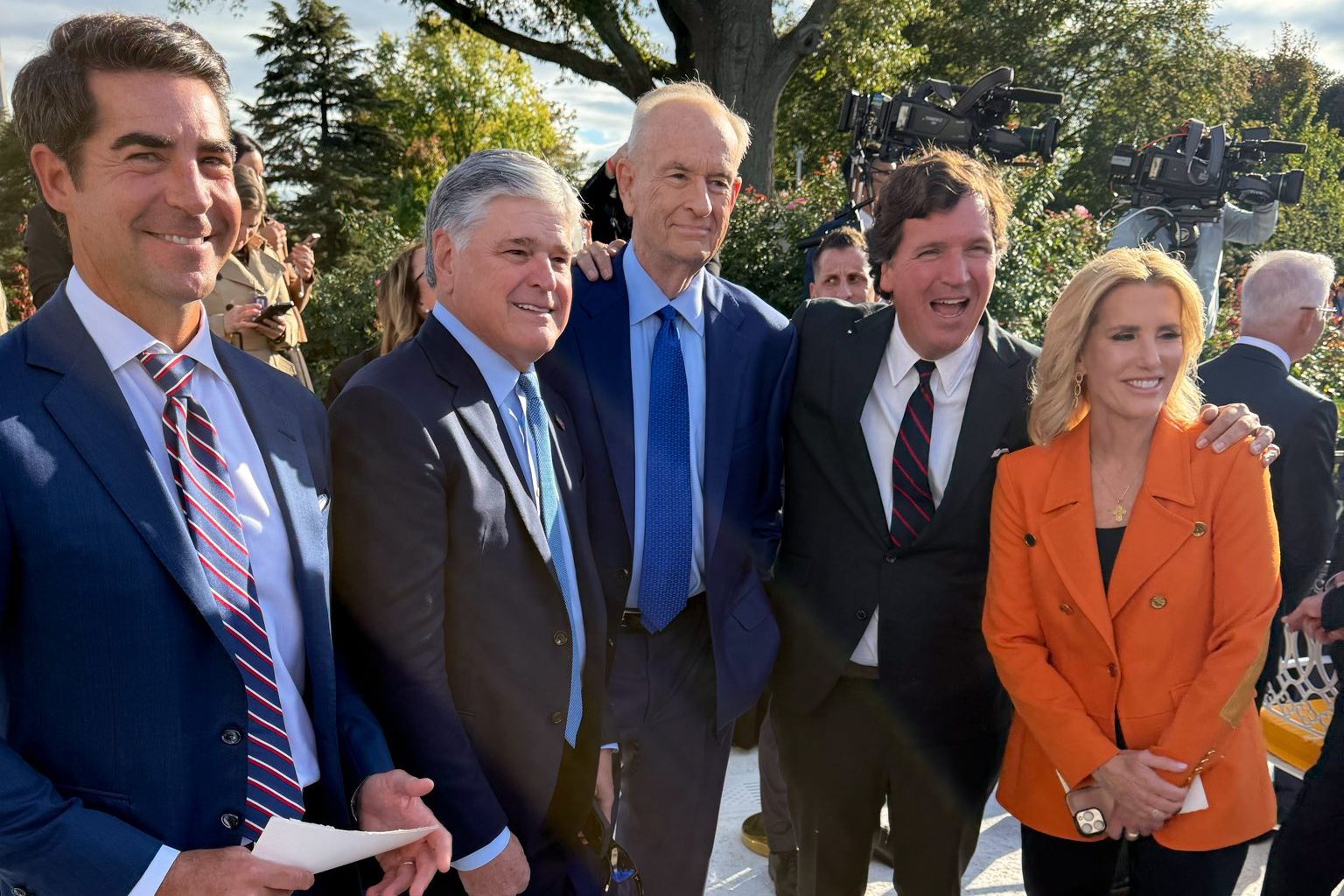The American right has a problem: it can’t stop talking about itself. Commentators, academics and journalists of what used to be called a “conservative” persuasion all tend to think that their ideas are tremendously interesting. And, in the way a difficult child becomes argumentative when he or she isn’t getting attention, they fight. They fear irrelevance and so they fall out with each other and take sides in order to prove to themselves that they have something worth saying. Things become messy and nasty and everybody gets carried away – usually in the hope of grabbing their own slice of an all-too easily distracted online audience. (Why else am I writing this?)
Today we see the quarrelsome tendency of the so-called “New Right” at work in the squabbles over Tucker Carlson, Ben Shapiro, Kevin Roberts, Nick Fuentes and whether it’s OK to praise Hitler.
But we also saw it six years ago, in the so-famous-it’s-now-largely-forgotten debate between David French and Sohrab Ahmari in 2019. This was a curious clash between two highly intelligent men which took place in the months before a global pandemic shook the world. The French vs Ahmari argument was over big ideas: the First Amendment and the culture wars, jurisprudence and liberty, the free market and nationalism, technocracy, Catholicism and family values. The title of the actual debate, hosted at the Catholic University of America and moderated by the New York Times’s Ross Douthat, was “What is Integralism now?” (Put that question in your Chestertonian pipe and smoke it, you beta cuck.)
It was also about manners. Should conservatives keep upholding the importance of civility and lose? Or be as vicious as the left and win? Ahmari, representing the emergent “post-liberal” consensus, was on Team Rude. There could be “no polite, David French-ian third way around the cultural civil war,” he said. “The only way is through.” And at the time that seemed to be a clinching argument. French, a NeverTrumper, represented the tired and failed politics of the George W. Bush era. Few wanted to hear his equivocations when #MeToo was still empowering a particularly virulent form of feminism and controversies over “drag-queen story hour” were being were lost.
But, boy oh boy, what a boreathon did Sohrab cause! For weeks, right-of-center pundits continued to weigh in on whether they were Frenchist or Ahmarite. Most commentators waffled out a third-way of saying there is no third-way: French was wrong, yes, but conservatives should not necessarily embrace the Jacobite tendencies of the MAGA fringe. Ergo, facto, propter, hoc.
Then came 2020 – Covid, Black Lives Matter, peak woke, a contested election – and conservatives became increasingly radical. The left really was evil and needed to be smashed. Right-wingers started talking confidently about a “reverse march through in the institutions.” By the time of Trump’s reelection last year, and in the dizzying first months of his second administration, the New Right’s triumph seemed complete. J.D. Vance, who espoused the “paleo” or “post-liberal” worldview so eloquently, became Vice President. From day one, the Trump-Vance administration went to war with DEI and Harvard and anybody else who stood in the way. And on Liberation Day, Trump ignored the bleating of the free marketeers and upended the global financial status quo in favour of protection.
But the David Frenches of this world never quite went away. They merely licked their wounds. And now, amid the agonized infighting over Tucker Carlson’s decision to interview the Groyper-in-Chief Nick Fuentes, they are attempting to exact their oh-so-civilized revenge.
At the think-tanks, with all those nervous donors, the knives are out. Kevin Roberts, the president of the Heritage Foundation, at first defended Carlson. Then, under pressure, he performed a spectacular reverse-ferret and groveled.
On Friday, Christopher Long and Thomas Lynch, the former president and chairman of the Intercollegiate Studies Institute, resigned from the board in disgust at what they called the “post-liberal hijacking” of their influential non-profit. In an “Open Letter to the Conservative Movement,” Long and Lynch denounced ISI’s current president, Johnny Burtka, for his “no enemies to the right” leadership, for indulging the “media crank Tucker Carlson,” the “postliberal icon Patrick Deneen,” the “neoreactionary Curtis Yarvin” and “others who seek to undermine the liberal ideas of the American Founding.” They denounced ISI’s Project Cosmos podcast for pandering to the “Yarvin-Fuentes-Carlson echo chamber”.
What Long and Lynch conveniently ignored is that Nick Fuentes in fact loathes Curtis Yarvin, whom he regards as a sort of controlled-opposition agent for organized Jewry. But who cares about logic when you’ve decided that you are defending America’s founding?
David French isn’t failing to seize the moment. “Once you’ve demolished respect for liberal democracy and demolished real value in rectitude and character in public life, it’s a short trip nihilism and fascism,” he declared on X, displaying something of a Cassandra complex.
Again, several barrages of other conservative media voices have taken to social media to clarify the position of their own bright minds in this celestial constellation of 21st century intellectualism. “No, the post-liberals aren’t solely responsible for the Groyper moment,” intoned the former National Review columnist Jonah Goldberg. “But the claim that they didn’t help… to get us to this point is such obvious contrafactual nonsense.”
In reply, various new-right influencers, who’ve been carefully building their large and “based” audiences for a long time, have taken to bemoaning all the fractiousness while pining for that recently lost voice of reason, the murder victim Charlie Kirk. As the Daily Wire’s Matt Walsh put it, “everything that’s happened over the past two months has signalled to the left that assassinations work. Take out one of our leaders ands we’ll start eating each other.”
As ever in American conservatism, there’s masses of grandstanding and sentimentality covering over the more instinctive vanity and self-preservation. It’s exhausting. I love American conservatives, and it’s a sign of a vigorous culture, I suppose, to treat ideas and principles as worth fighting for. But is it really necessary for everyone to take themselves so seriously? Surely the most conservative insight of all came from that limey Prime Minister Arthur Balfour, who said: “Nothing matters very much and few things matter at all.”


























Leave a Reply